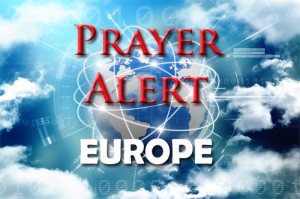Displaying items by tag: proselytising
Turkey: Christian persecution
The high degree of Turkey’s religious nationalism places incredible pressure on Christians. The government doesn’t target Christians directly, but its nationalistic bias leaves little room for Christians to preach the gospel, which is considered an opposing message. Converts from Islam face social opposition, and often lead double lives to keep their faith hidden from family and community. If found out, they might be threatened with divorce and loss of inheritance rights, and all Christians face employment discrimination. Pray for Muslim-background converts to minister graciously and wisely to their families, especially if they are labelled and treated as traitors. Pray for evangelist David Byle who was refused re-entry into Turkey to be with his family. He had lived and preached there for 19 years and had experienced increasing harassment. See
Turkey: pastor facing 35-year sentence
16 April was pastor Andrew Brunson’s first day in court answering espionage charges. He pastors a small Protestant church, and is accused of supporting the attempted 2016 coup to overthrow president Erdogan by aligning himself with terrorist organisations. If convicted, the 50-year-old faces 35 years in prison. ‘I was never involved in any illegal activities,’ the American Pastor told the court in Turkish, the language he speaks fluently after 23 years in the country. After the hearing, instead of being returned to the prison he had recently been held in, he was taken to an overcrowded, extremely grim prison. The USA said prosecutors have no case against the pastor. He is accused of ‘the supposed crime of Christianisation’. Brunson’s Turkish lawyer told Reuters that prosecutors interpret the pastor’s religious work as ‘aiding terror organisations; there is evidence revealing that he was arrested due to his faith.’
Afghanistan: a spiritually barren land
The Afghan government does not recognise any of its citizens as Christians, nor is anyone permitted to convert to Christianity. However, there are no laws forbidding proselytism, although the practice is contrary to Muslim beliefs. There is only one legally recognised church - the Catholic chapel at the Italian Embassy - but it is not open to local nationals. There are also Christian religious facilities at foreign military bases, such as an Eastern Orthodox church at the Romanian base in Kandahar. Items and articles belonging to religions other than Islam, such as Bibles, are prohibited. Muslims who change their faith to Christianity are subject to societal and official pressure, which may lead to death. However, many sources claim there is a secret underground church of Afghans. The US state department estimates that the size of this group is between 500 and 8,000 individuals. The complete Bible is available online in Dari, and the New Testament is available in Pashto.
French teacher suspended for reading Bible to pupils
In France, teachers may teach about the Bible, but are strictly forbidden from proselytising or preaching. A step to keep religion out of schools was taken in 2013 when schools were ordered by law to put a charter in a prominent place to remind people of fifteen secular Republican principles. Last week a teacher in Malicornay, central France, was suspended after reading passages of the Bible to his pupils, aged between nine and eleven. Parents of pupils in the class objecting to the teacher's lessons wrote an anonymous letter of complaint to the headmaster, who then decided to suspend the teacher for his apparent disregard of France's strict secularism laws that separate religion from public sphere, in particular in education. The national education board is reviewing the case. France takes secularism - or laïcité - very seriously; however, it is unusual for a teacher to be suspended for reading a passage from the Bible.



